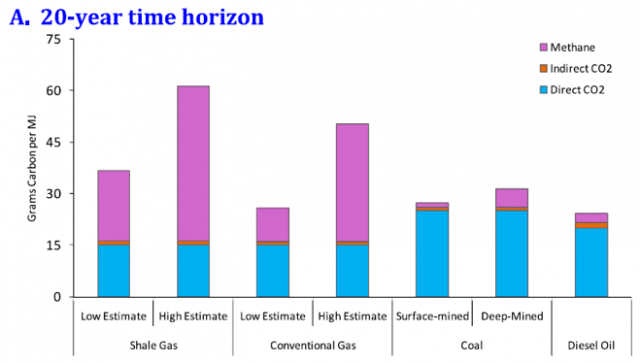Unconventional gas offers no advantage over other fossil fuels when considering its impact on the climate, according to a new report from a group of researchers at Cornell University. The Cornell Team, who made waves in the shale debate with groundbreaking research on methane leakage in gas production are challenging the gas industry’s claim that gas offers a clean, environmentally-friendly alternative to conventional fossil fuels. The team, comprised of Robert Howarth, Anthony Ingraffea and Renee Santoro, recently released a companion study to their contentious April 2011 report, continuing to reveal that shale gas is inadequate as a bridge fuel and may be worse for climate change in the long run than coal.
The team’s new study analyzes the combined effect of methane and carbon dioxide in the atmosphere over a 20-year timeframe. Investigating the impact of emissions from both electricity generation, which accounts for about 30 percent of US gas usage, and heat generation, which accounts for the majority of the country’s gas usage, the report emphasizes the enormous projected role of unconventional gas – and its associated emissions – in America’s energy future.
Gas currently accounts for nearly a fifth of the total U.S. greenhouse gas emissions. That portion is expected to rise to nearly one quarter in the near future. Given the dramatic role methane emissions play in a warming atmosphere, the Cornell team is urging US lawmakers to reevaluate the current regulatory regime monitoring and enforcing emission caps for the industry.
In a
press release Ingraffea framed the issue as one requiring immediate policy response: “Can shale-gas methane emissions be reduced? Clearly yes, and proposed
EPA regulations to require capture of gas at the time of well completions are an important step. Regulations are necessary to accomplish emission reductions, as economic considerations alone have not driven such reductions.“
Ingraffea’s concern is that we are committing ourselves too readily to unconventional gas without considering the long-term consequences of that shift.
“It may be extremely expensive to reduce leakage associated with aging infrastructure, particularly distribution pipelines in cities but also long-distance transmission pipelines, which are on average more than 50 years old in the U.S. Should society invest massive capital in such improvements for a bridge fuel that is to be used for only 20 to 30 years, or would the capital be better spent on constructing a smart electric grid and other technologies that move towards a truly green energy future?” he asked.
If the benefits of unconventional gas are being overstated, as this team believes they are, then the real threat unconventional gas poses to our climate is not being fully considered. Howarth believes the full-scale, cumulative impacts of unconventional gas should be more realistically considered, especially given our rapid approach to what the team calls a
climatic “tipping point.”
Methane is a major component of unconventional gas and
its characteristically high global warming potential (
GWP) is a driving factor in the team’s sense of urgency. Because methane has 105 times the
GWP of carbon dioxide, the team is working to emphasize the impact of methane emissions on a 20-year timescale, something critics have slighted as
unrealistic. Although methane is much more potent than carbon dioxide, it has a tenfold shorter duration in the atmosphere.
But the Cornell team thinks we need to start considering the short-term, and making better decisions faster.
“We believe the preponderance of evidence indicates shale gas has a larger greenhouse gas footprint than conventional gas, considered over any time scale. The greenhouse gas footprint of shale gas also exceeds that of oil or coal when considered at decadal time scales, no matter how the gas is used,”
says Howarth.
The Cornell Team has had no welcome reception among gas industry support groups.
Energy in Depth, the industry-funded front group, led a vitriolic attack against the Cornell team after the release of their initial report, calling their findings a
shale gas smear. This time around their attack has been
equally formidable.
But the Cornell team is undeterred. “We stand by the conclusion of our 2011 research: ‘The large [greenhouse gas] footprint of shale gas undercuts the logic of its use as a bridging fuel over coming decades, if the goal is to reduce global warming.”
And it’s probably worthwhile noting that the goal of the gas industry, and their coalition of public relations groups, is not to reduce global warming. It’s to sell gas.







